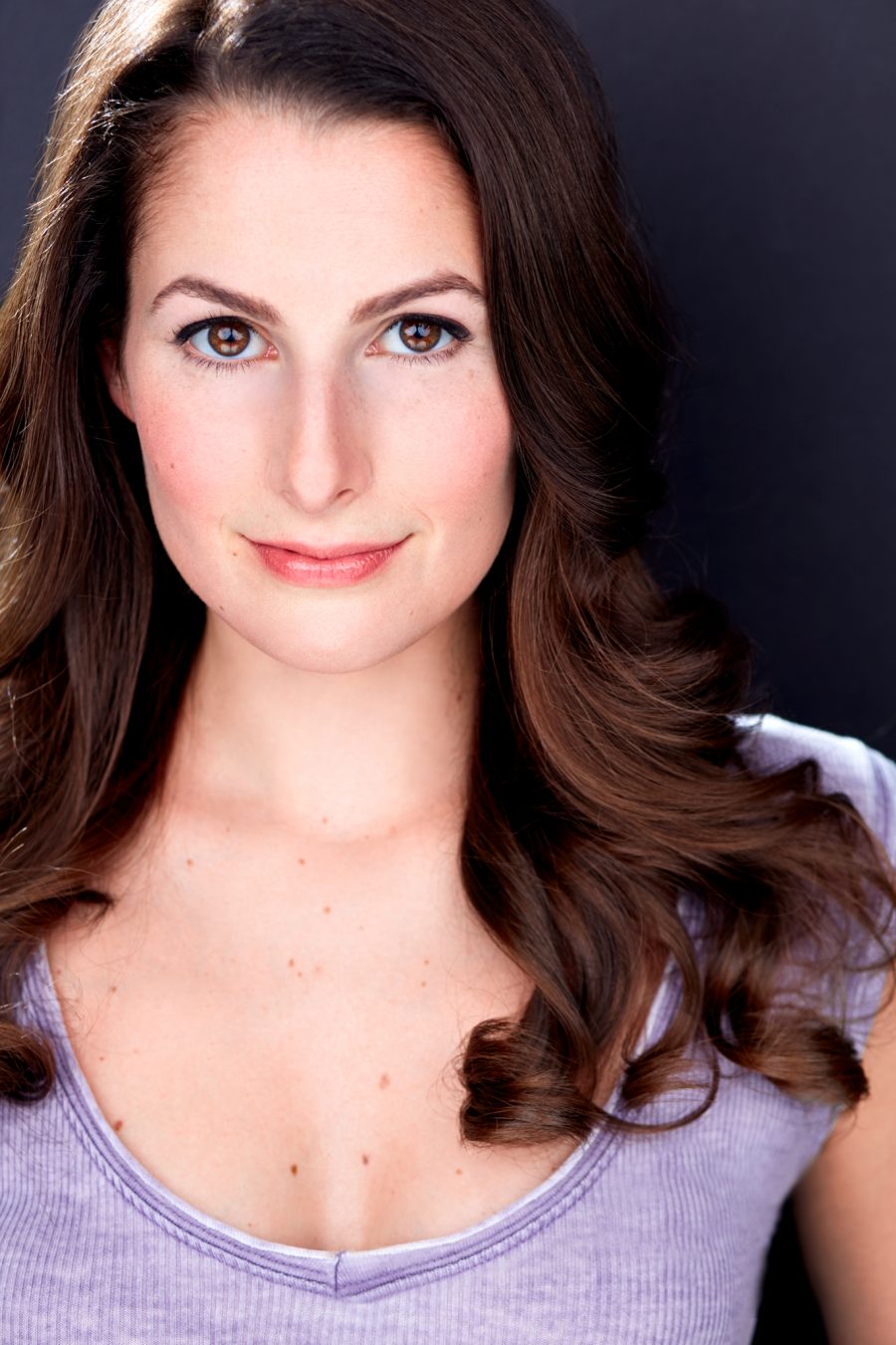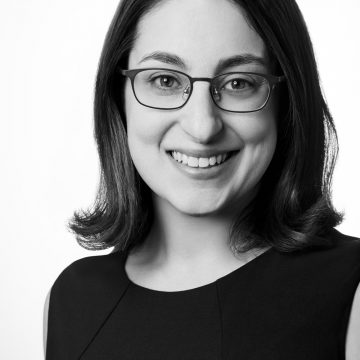
Rachel Zatcoff as Tevye’s eldest daughter Tsaytl in Fiddler on the Roof. Photo: Victor Nechay (properpix.com).
Interview: Yiddish Fiddler on the Roof Actor Rachel Zatcoff
Debra Caplan
Fiddler on the Roof is back Off Broadway—this time in a Yiddish version directed by Broadway legend and Oscar and Tony Award-winner Joel Grey, and in a production by the Folksbiene. Though Fiddler was translated into Yiddish by Shraga Friedman in 1965, just one year after its record-breaking Broadway debut, this is the first ever Yiddish-language production in the United States.
The DYTP’s Debra Caplan spoke with Rachel Zatcoff, who is playing Tevye’s eldest daughter, Tsaytl. Fiddler on the Roof in Yiddish is currently in previews at the Museum of Jewish Heritage. The production opens July 15 and runs through September 2.
Debra Caplan: What inspired you to audition for this show? As a non-Yiddish speaker, what made you want to be part of the first professional Yiddish-language production in the United States?
Rachel Zatcoff: I can’t believe it’s taken this long to do this show in Yiddish here because it just seems like it’s meant to be. These characters would have been speaking this language, and it just feels so true to the story. I think a lot of people in our first previews have been surprised—especially the non-Yiddish speakers—because there’s a visceral reaction. This show is so powerful in Yiddish. Everything just lands a little bit deeper. It’s amazing.
When I heard that the Folksbiene was going to be doing Fiddler in Yiddish, I immediately wanted to be a part of it. I’ve always wanted to be part of a Fiddler production anyway, because it’s such a perfect musical. The book is amazing, the story is incredible, the music is powerful. But I especially wanted to be part of this production. I was literally walking down the street listening to the original Broadway cast recording on my headphones just praying that I would get this job. I wanted it so badly.
Every single person in this cast feels that way. Everybody just understands how amazing this opportunity is and everybody has that sense of gratitude.
Fiddler on the Roof is such a sentimental show for so many people. A lot of us in the cast already felt so connected to it that it was a fun challenge and joy to learn it in Yiddish. It’s more beautiful—it’s like the show is taken to a whole new level in this language. I can’t speak highly enough about it. This is one of the most exciting and special things I’ve done, ever.
DC: As a non-Yiddish speaker, how did you learn to act in Yiddish? What was the rehearsal process like for you?

Rachel Zatcoff.
RZ: When I was learning Di goldene kale (The Golden Bride) two years ago, I was going in as a replacement and I only had ten days to learn it, so it was a very different experience. I was basically just learning the sounds.
This time around was incredible because I was able to not just immediately memorize the Yiddish; I was actually learning—the process was so different. Now I feel like I’m really able to sink my teeth into the Yiddish because I had the proper amount of time.
It’s like learning an opera—you have to learn every word that you’re saying, and you have to learn every word that your scene partner is saying.
Our scripts have three sections for every line. There’s the Yiddish, then right underneath is the original English, and right under that is a literal translation of the Yiddish translation. In some cases it’s exactly the same, but in some it’s different. The creative team just kept reiterating that we have to stay true to the Stein, Bock, and Harnick musical. But there are certain moments and certain lines where there are differences—in a lot of cases, it’s the same meaning, but just what you would say in Yiddish.
For example, in the scene in the tailor’s shop in Act Two, Golda says to me, “How’s the baby?” And in the original Broadway show, Tsaytl just replies, “He’s a miracle, he’s wonderful.” But in the Yiddish, I say “Keyn shum beyz oyg, mame” (“No evil eye, Mama”) first. We had lots of conversations about moments like that.
DC: Like most of the cast, Joel Grey also doesn’t speak Yiddish. What has it been like working with him on this production and how has he approached the challenge of directing a production in another language?
RZ: Working with him has been absolutely incredible. As a director—mostly everyone knows him as an actor—but as a director, he comes at it from an acting standpoint. We actually rehearsed all of the scenes in English first with him. We sat around a table and read the text in English, then we read the literal Yiddish translation, and then we read it in Yiddish. We’d go back and read it in English, and then go back and read it in Yiddish.
It was quite a process in those first few weeks of rehearsal because Joel really wanted us to get to the root of these characters and these scenes that are so beautifully written.
He just has so much to offer. He asks a lot of questions—the right questions. He keeps pushing us, in the best possible way, to keep making the show better and better. He cares about it so much. His passion for this production is just incredible.
Joel was so patient and wanted us to be patient—and it was a challenge, because you wanted to be running the lines in Yiddish right away. But he said “until you really understand what you’re saying you can’t skip these steps.” And I’m so glad he had us rehearse this way.
DC: How much background reading on the Tevye stories, on Sholem Aleichem, on Yiddish literature and culture, etc. did you and the other cast members do to prepare for this production?
RZ: They gave us a lot of source material to read. I read a lot of it on my own, and I think a lot of people did. They were constantly sending us emails with research material. They also had us watch the 1939 film—we all watched that together within the first week and I found it really interesting. The core of what the musical is is there.
We all read Alisa Solomon’s book Wonder of Wonders, we’ve all been reading other books and the original stories, and watching interviews and other videos that the creative team shared with us.
I didn’t know about any of it until doing this production. I didn’t even know that there was a Yiddish version.
DC: Let’s talk about Tsaytl. What’s it like to play her? What’s particularly interesting for you as an actress about this role?
RZ: It is totally different from anything I’ve ever done. I don’t sing very much in the show. My training is in classical voice and opera and I’ve done a lot of ingénue roles, but in this part, I have a lot of meaty scene work to do. It’s presenting new challenges to me but it also feels like a treat.
I love my role. I love her. She’s the first one to break the tradition, she’s like a pioneer woman. And she’s gets her strength from her parents, ironically enough. She’s raised by Golda and Tevye, who are equal in strength as far as I’m concerned, and at the root, that’s what inspires her to be the first one to break the traditions. It’s her time, I think she feels that it’s time that these things change. I love playing that. I love being the oldest sister. I also don’t have sisters in real life, I have two brothers, and it’s been really wonderful to experience being the oldest of five girls and what that feels like. And being the first one to break the mold.
DC: You’ve had a few previews at this point. How have audiences responded to the performances so far?
RZ: It’s been incredible. When we stepped out on stage for “Tradition” in the first preview, it was one of the most thrilling, electrifying experiences I’ve ever had on the stage. The energy in the theatre is just electric. The audience is so with us for the whole ride. And you know, it’s a big show. It’s a big, long show. And they are with us the whole way through, and at the end, people are in tears—I mean they’re still crying even when we’re coming out to the lobby. And the folks that are coming out that speak Yiddish, and the folks that speak Russian, and the people who speak neither—everybody is having the same type of reaction, everybody loves that it’s an intimate version of Fiddler. Since it’s being done in a smaller space, it really adds to the intimacy of the show.
DC: I can’t wait to see it myself. Finally, is there anything else you’d like people to know about this show?
RZ: I think a lot of people hesitate because of the language. People are hesitant to sit through a three-hour musical in another language, just like people are hesitant to go to the opera. But I would just encourage people to try it. I’ve spoken to a few people for whom it was their first time seeing something with titles, and they’ve loved it so much and they want to come again.
It’s a really important time for this show to be happening—particularly in the language, in what I would say is the native language of the show, because of everything going on in our country and our world right now. It’s a story about immigrants and people trying to start a new life in a new place and everything that comes with that.
I think this is a really important production to see, and it’s not even that I’m biased and love this show and love these people and love musical theatre. This particular production is something really special. I hope that not just Yiddish speakers and not just theatre people are coming out to see it. I think it’s a really necessary story right now and we have a beautiful production of it.
You can read more about Fiddler on the Roof in Yiddish from the DYTP here, here, and here.
